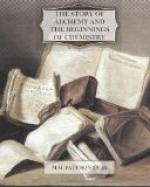If the reader turns to a modern book on chemistry (for instance, The Story of the Chemical Elements, in this series), he will find, at first, superficial descriptions of special instances of those occurrences which are the subject of the chemist’s study; he will learn that only certain parts of such events are dealt with in chemistry; more accurate descriptions will then be given of changes which occur in nature, or can be produced by altering the ordinary conditions, and the reader will be taught to see certain points of likeness between these changes; he will be shown how to disentangle chemical occurrences, to find their similarities and differences; and, gradually, he will feel his way to general statements, which are more or less rigorous and accurate expressions of what holds good in a large number of chemical processes; finally, he will discover that some generalisations have been made which are exact and completely accurate descriptions applicable to every case of chemical change.
But if we turn to the writings of the alchemists, we are in a different world. There is nothing even remotely resembling what one finds in a modern book on chemistry.
Here are a few quotations from alchemical writings [1]:
[1] Most of the quotations from
alchemical writings, in this
book, are taken from a series of
translations, published in
1893-94, under the supervision of
Mr A.E. Waite.
“It is necessary to deprive matter of its qualities in order to draw out its soul.... Copper is like a man; it has a soul and a body ... the soul is the most subtile part ... that is to say, the tinctorial spirit. The body is the ponderable, material, terrestrial thing, endowed with a shadow.... After a series of suitable treatments copper becomes without shadow and better than gold.... The elements grow and are transmuted, because it is their qualities, not their substances which are contrary.” (Stephanus of Alexandria, about 620 A.D.)
“If we would elicit our Medecine from the precious metals, we must destroy the particular metalic form, without impairing its specific properties. The specific properties of the metal have their abode in its spiritual part, which resides in homogeneous water. Thus we must destroy the particular form of gold, and change it into its generic homogeneous water, in which the spirit of gold is preserved; this spirit afterwards restores the consistency of its water, and brings forth a new form (after the necessary putrefaction) a thousand times more perfect than the form of gold which it lost by being reincrudated.” (Philalethes, 17th century.)
“The bodily nature of things is
a concealing outward vesture.”
(Michael Sendivogius, 17th century.)
“Nothing of true value is located
in the body of a substance, but
in the virtue ... the less there is of
body, the more in
proportion is the virtue.” (Paracelsus,
16th century.)




